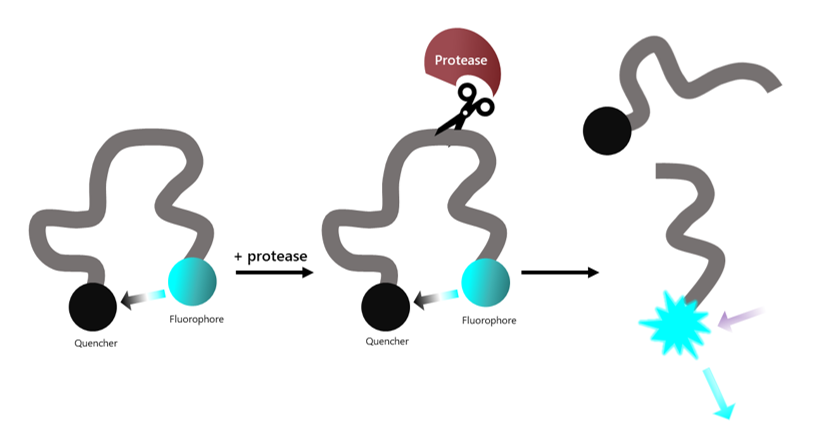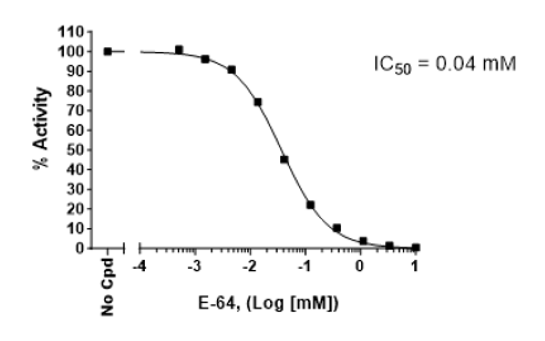Cathepsin K Inhibitor Screening Assay Kit
The Cathepsin K Inhibitor Screening Assay Kit is designed to measure the protease activity of Cathepsin K for screening and profiling applications. The Cathepsin K assay kit comes in a convenient 96-well or 384-well format, with enough purified Cathepsin K, its substrate, and Cathepsin Buffer for 96 or 384 reactions. This kit includes the inhibitor E-64 as control.

Figure 1: Illustration of the assay principle.
The substrate is an internally quenched flourogenic substrate.Proteolysis releases the highly flourescent Mca from the quencher. Flourescence intensity increases proportionally to the activity og the protease.
Need us to run inhibitor screens or profile your compounds against Cathepsin K? Check out our Protease Screening Services.
- Adjustable micropipettor and sterile tips
- Fluorescence plate reader capable of measurement at λex360/λem460 nm.
96 reactions
| Catalog # | Name | Amount | Storage |
| 11071 | Cathepsin K, His-Tag* | 1 µg | -80°C |
| Fluorogenic Cathepsin K Substrate (5 mM) | 90 µl | -80°C | |
| 4x Cathepsin Buffer | 2 ml | -20°C | |
| 0.5 M DTT | 200 µl | -20°C | |
| 1 mM E-64 | 10 µl | -20°C | |
| 79685 | 96-well black microplate | 1 | Room Temp |
*The concentration of the protein is lot-specific and will be indicated on the tube
384 reactions
| Catalog # | Name | Amount | Storage |
| 11071 | Cathepsin K, His-Tag* | 2 x 1 µg | -80°C |
| Fluorogenic Cathepsin K Substrate (5 mM) | 2 x 90 µl | -80°C | |
| 4x Cathepsin Buffer | 2 x 2 ml | -20°C | |
| 0.5 M DTT | 2 x 200 µl | -20°C | |
| 1 mM E-64 | 10 µl | -20°C | |
| 79961 | 384-well black microplate | 1 | Room Temp |
*The concentration of the protein is lot-specific and will be indicated on the tube
Cathepsin K is a potent protease that belongs to the lysosomal cysteine protease family. It mediates bone resorption and is an attractive target for anti-osteoporosis drug development. The protease has also been associated with skeletal homeostasis as mutations in the gene encoding cathepsin K is linked to a rare autosomal recessive disorder, pycnodysostosis, which is characterized by abnormal bone density and decreased bone turnover. Further, cathepsin K has been implicated in diseases of the central nervous system (CNS), cardiovascular system, and the respiratory system. Studying cathepsin K can lead to a better understanding of its role in disease beyond the musculoskeletal system.
Dai R., et. al., 2020 Frontiers in Cell and Developmental Biology 8.



